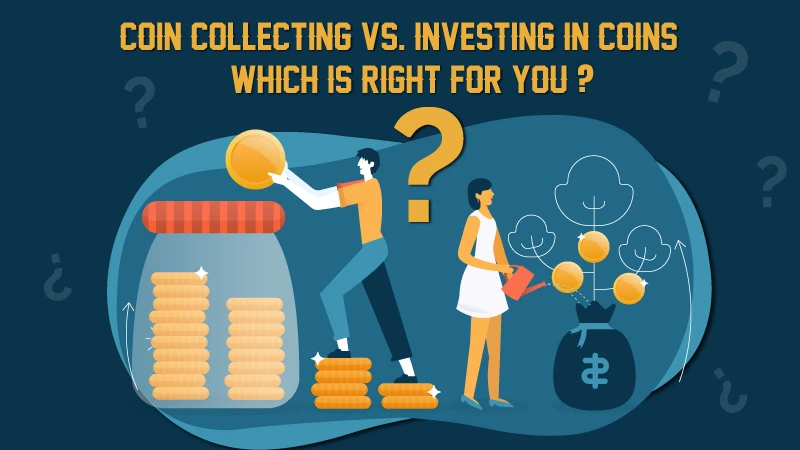Coin Collecting vs. Investing in Coins: Which Is Right for You

By BullionMentor on November 23, 2023
Millions of people throughout the globe enjoy two related but distinct hobbies: coin collecting and coin investing. Coin collecting is also known as numismatics. It is about studying and gathering coins, tokens, paper money, and related items. Collectors value these objects for their art, history, or personal meaning. They may focus on specific periods, places, or themes. In short, collecting is all about fun, learning, or preserving history. Investing in coins, on the other hand, means buying coins mainly for their precious metal content. Investors expect their coins to become more valuable over time, giving them financial returns. While they may appreciate the history and art of their coins, their main goal is making money. Let's explore more about the fascinating worlds of coin collecting and investing, each offering unique avenues for discovery, enjoyment, and potential financial gains.
Coin Collecting: A Hobby with a Rich History
Coin collecting has its origins in ancient Rome. It was a favorite pastime among the elite. The hobby's popularity expanded during the Renaissance when scholars and aristocrats began collecting ancient coins for their historical importance and artistic charm. As the 19th century approached, coin collecting became popular among different social classes. The introduction of coin catalogs and the formation of numismatic societies played a vital role in promoting its growth.
People first made gold coins in Lydia, a place in modern-day Turkey, around 600 BCE. These early coins were a mix of gold and silver called electrum. As time passed, many different empires and civilizations, like the Romans, Byzantines, and Islamic Caliphates, started using gold coins as money.
Gold coins have always been linked with wealth and power. They've also been influential in global trade. Coins, such as the Spanish doubloon and the British guinea, helped countries trade with each other. Today, gold coins are unique in collecting and investing in precious metals.
What is Investing in Coins?
As said earlier, investing in coins involves purchasing them mainly for their precious metal value. With the purpose of making money, investors expect their coins to increase in value over time.
Investing in coins involves several essential steps. First, one needs to decide on one's goals and risk tolerance. Next, one needs to learn about different types of coins for investment. Options include bullion, commemorative, and rare coins. One also needs to know what can make a coin valuable. On our Bullion Mentor platform, you can learn about important factors like the metal it's made of, its rarity, its condition, and its market demand. When you buy coins, consider working with trusted dealers or going to coin shows to ensure you're paying a fair price.
Benefits of Coins Collecting
Coin collectors are also known as numismatists. They have a deep appreciation for the overall artistic and historical nuances of coin collection; in addition, the cultural aspects of coin collection make it a rewarding experience. Some even specialize in specific periods, countries, or themes and enjoy sharing their knowledge with fellow collectors and enthusiasts. Coin collecting offers several benefits that make it a rewarding and enjoyable hobby. Here are four key benefits of collecting coins:
Earning Money
Unlike many hobbies that cost money without any financial return, coin collecting is profitable. Collector coins tend to increase in value over time. Some super rare coins can be worth millions when sold, meaning that coin collecting offers enjoyment and the potential for financial gain. If you decide that coin collecting is not for you in the future, you can sell your coins and either recoup your investment or even make a profit.
Satisfaction
Finding a rare coin that you've been searching for can bring a great sense of satisfaction. Building a collection of coins with exceptional beauty can be immensely gratifying. It is especially true when only a few people have such coins.
Stress Relief
Starting a hobby like coin collecting can be a therapeutic escape in a world filled with stress and worries. Coins' beauty and historical significance can transport you to a different world. It helps you relax and take your mind off stress and other concerns.
Benefits of Investing in Coins
Investing in coins can be profitable for those who do their homework and make informed choices. It offers the potential for financial growth and allows investors to concentrate on specific areas of the coin market while closely monitoring market trends. Here are the main benefits of investing:
Profit Potential
Coin investors aim to make money from their purchases. They might hold coins for a long time, like ten years or more, or seek quicker profits. Their decisions are driven mainly by the hope that their collection will increase in value.
Focused Approach
People who invest in coins choose coins based on their potential for making money. Some focus on precious metals like gold, silver, or platinum because they tend to hold their value. Others with a strong interest in coins may look for specific series or pieces they believe will become more valuable or are currently undervalued.
Opportunistic Buying
Investors are opportunistic when they make purchases. They might buy more gold or silver if prices drop. If they find a coin sold at a lower price than anticipated, they will purchase it, even if they were not actively searching for it.
Risk of Coin Collecting
Coin collecting is a challenging hobby. It can be a challenge to find and acquire rare coins. If you're new to coins, it's better to stick with traditional investments until you learn more about coins. Coin collecting can be a fun hobby as long as you're cautious.
However, you can get your hands on the desired coins with the right attitude, bargaining skills, and negotiation abilities. Learn about coins, don't buy expensive ones you don't know much about, avoid phone and mail advertisements, and be careful with dealers who say their coins are a "good investment."
If you're looking for a hobby that provides a challenge, coin collecting is an excellent choice. If you understand coins well and make wise choices, you can enjoy the hobby without losing much money.
Risk of Investing in Coins
Investing in coins carries risks you should know about. Two key risks are market changes and rarity:
- Market Changes: Coin values can go up and down like other investments. Some old coins, especially from the 1700s and 1800s, hold their value well and help protect against rising prices. But their worth can change due to market conditions and collector demand. Also, buying and selling coins may involve high fees that cut your profits.
- Rarity: The rarity of a coin, meaning how uncommon it is, affects its value a lot. Some coins, usually those priced at $20,000 or more, and some lower-cost silver dollars, are called "investor" coins. They can go up and down in value quickly because only a few people collect them for a long time. Very high-grade modern coins, graded as MS-68 or higher, can also change in value quickly.
Conclusion
Even though digital money and other new ways to invest are becoming more popular, collecting coins and investing in them still have a bright future. Coins have a solid link to history and are made of valuable metals, so that people will be interested in them. The benefits of investing in precious metals are pretty promising. Successful precious metal coin investors stay informed about the precious metals market and coin values. They pay attention to pricing trends to maintain buying decisions and avoid paying too much for coins. Technology makes it easier to learn about and get coins through the internet and coin collector communities. Bullion Mentor is one of the data sources where you can learn about coins and the bullion industry.
FAQ's
- What is the best coin to collect for investment?
- Is collecting coins a good investment?
To make the right choice, consider these 5 top gold bullion coins: British Gold Britannia (Royal Mint, 24 carats, 999.9 fineness, Contains one troy ounce of gold, VAT and Capital Gain Tax-Free for EU residents, Available in fractional sizes), Gold Sovereign (Royal Mint, Pure gold content: 7.322 grams, Fineness: 916.67, Diameter: 22.05mm), Royal Tudor Beasts - Lion of England (Royal Mint, Pure gold content: 31.1035 grams, Fineness: .9999 (24 carats – fine), South African Gold Krugerrand (South African Mint, Pure gold content: 31.103 grams, Fineness: 916.7, Dimensions: 32.77mm Diameter x 2.84mm Thick) and Canadian Gold Maple Leaf (Royal Canadian Mint, Pure gold content: 31.103 grams, Fineness: .9999 (24 carats – fine), Dimensions: 30mm Diameter x 3mm Thick).
Yes! For investors, collecting coins provides a unique opportunity to diversify portfolios and ensure you can hedge against inflation in an uncertain economy. Gold and silver coins, in particular, have a strong history of retaining their value during financial turbulence. The limited supply of rare coins will be the reason for a continual demand surge as collectors and investors seek these valuable and historically significant pieces.
